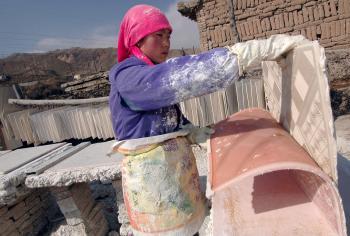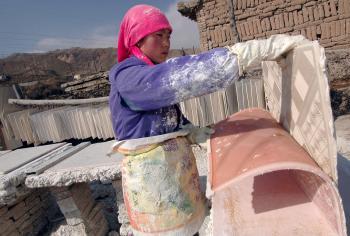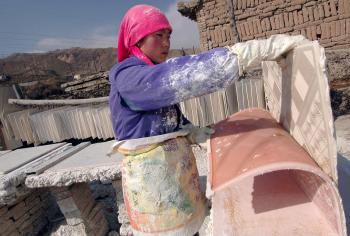There is a “strong association” between Chinese drywall, rotten egg-smelling hydrogen sulfide, and the corrosion of metal in U.S. homes, according to a report by the Consumer Product Safety Commission (CPSC) released Nov. 23.
“In ways still to be determined, hydrogen sulfide gas is being created in homes built with Chinese drywall,” the CPSC statement said. “Earlier studies found large amounts of elemental sulfur in the Chinese drywall.”
There have been no fires caused by corroding wires or electrical fixtures, said Scott Wolfson, spokesman for the CPSC on a conference call for media Nov. 23.
No studies have been released on the health effects homeowners have complained about—including nose bleeds, bronchitis, dizziness, headaches, fatigue, and irritated eyes. Many affected houses have a rotten-egg-like smell, metal is turning black, and appliances are failing.
“We’re still working towards that specific nexus between the health effects reported to us and the drywall itself,” said Wolfson. “That’s a commitment we certainly have to these affected families. We’ve been in those homes. We’ve felt it. I felt it, the chairman of CPSC has felt it.”
Most of the 2,100 homeowners who have complained about the drywall live in Florida and Louisiana. A domestic shortage of drywall following hurricanes Katrina and Wilma and nationwide building booms meant companies imported more from China. Enough of the tainted material was imported to build an estimated 60,000 to 100,000 homes nationwide, but around half ended up in Florida.
“In ways still to be determined, hydrogen sulfide gas is being created in homes built with Chinese drywall,” the CPSC statement said. “Earlier studies found large amounts of elemental sulfur in the Chinese drywall.”
There have been no fires caused by corroding wires or electrical fixtures, said Scott Wolfson, spokesman for the CPSC on a conference call for media Nov. 23.
No studies have been released on the health effects homeowners have complained about—including nose bleeds, bronchitis, dizziness, headaches, fatigue, and irritated eyes. Many affected houses have a rotten-egg-like smell, metal is turning black, and appliances are failing.
“We’re still working towards that specific nexus between the health effects reported to us and the drywall itself,” said Wolfson. “That’s a commitment we certainly have to these affected families. We’ve been in those homes. We’ve felt it. I felt it, the chairman of CPSC has felt it.”
Most of the 2,100 homeowners who have complained about the drywall live in Florida and Louisiana. A domestic shortage of drywall following hurricanes Katrina and Wilma and nationwide building booms meant companies imported more from China. Enough of the tainted material was imported to build an estimated 60,000 to 100,000 homes nationwide, but around half ended up in Florida.







